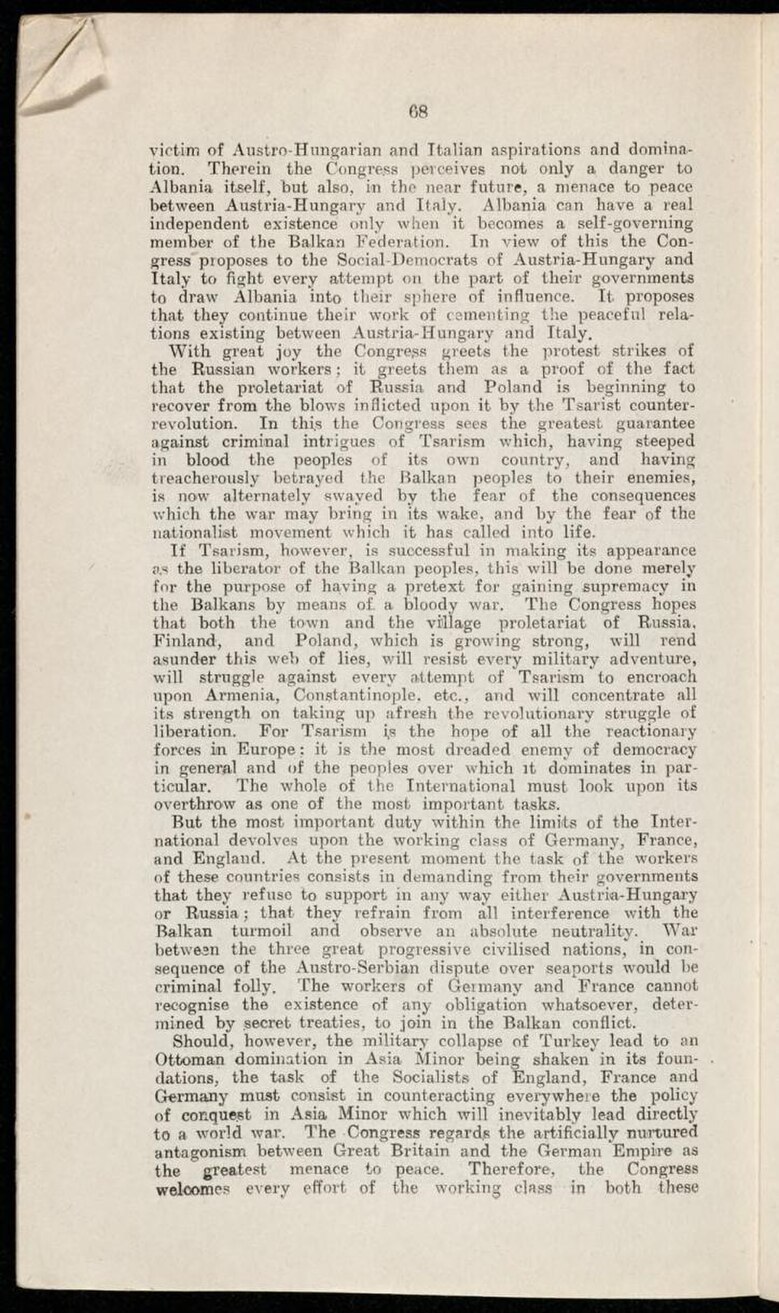68
victim of Austro-Hungarian and Italian aspirations and domination. Therein the Congress perceives not only a danger to Albania itself, but also, in the near future, a menace to peace between Austria-Hungary and Italy. Albania can have a real independent existence only when it becomes a self-governing member of the Balkan Federation. In view of this the Congress proposes to the Social-Democrats of Austria-Hungary and Italy to fight every attempt on the part of their governments to draw Albania into their sphere of influence. It proposes that they continue their work of cementing the peaceful relations existing between Austria-Hungary and Italy.
With great joy the Congress greets the protest strikes of the Russian workers; it greets them as a proof of the fact that the proletariat of Russia and Poland is beginning to recover from the blows inflicted upon it by the Tsarist counter revolution. In this the Congress sees the greatest guarantee against criminal intrigues of Tsarism which, having steeped in blood the peoples of its own country, and having treacherously betrayed the Balkan peoples to their enemies, is now alternately swayed by the fear of the consequences which the war may bring in its wake, and by the fear of the nationalist movement which it has called into life.
If Tsarism, however, is successful in making its appearance as the liberator of the Balkan peoples, this will be done merely for the purpose of having a pretext for gaining supremacy in the Balkans by means of a bloody war. The Congress hopes that both the town and the village proletariat of Russia. Finland, and Poland, which is growing strong, will rend asunder this web of lies, will resist every military adventure, will struggle against every attempt of Tsarism to encroach upon Armenia, Constantinople, etc., and will concentrate all its strength on taking up afresh the revolutionary struggle of liberation. For Tsarism is the hope of all the reactionary forces in Europe: it is the most dreaded enemy of democracy in general and of the peoples over which it dominates in particular. The whole of the International must look upon its overthrow as one of the most important tasks.
But the most important duty within the limits of the International devolves upon the working class of Germany, France, and England. At the present moment the task of the workers of these countries consists in demanding from their governments that they refuse to support in any way either Austria-Hungary or Russia; that they refrain from all interference with the Balkan turmoil and observe an absolute neutrality. War between the three great progressive civilised nations, in consequence of the Austro-Serbian dispute over seaports would be criminal folly. The workers of Germany and France cannot recognise the existence of any obligation whatsoever, determined by secret treaties, to join in the Balkan conflict.
Should, however, the military collapse of Turkey lead to an Ottoman domination in Asia Minor being shaken in its foundations, the task of the Socialists of England, France and Germany must consist in counteracting everywhere the policy of conquest in Asia Minor which will inevitably lead directly to a world war. The Congress regards the artificially nurtured antagonism between Great Britain and the German Empire as the greatest menace to peace. Therefore, the Congress welcomes every effort of the working class in both these
